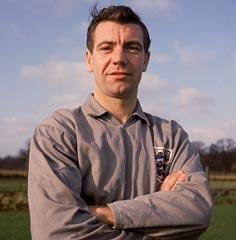Johnny Haynes, who died in hospital on Tuesday after a car crash, was one of the greatest passers of a football in British history.
 He became famous as the country's first 100-pounds a week player in 1961, yet all the game's top honours passed him by.
He became famous as the country's first 100-pounds a week player in 1961, yet all the game's top honours passed him by.
As a player and in his later life in business, he was a perfectionist and was hugely upset when the other person got it wrong.
He once said: "I accept that I gave this image of myself as a footballer, and even if I didn't express myself in quite the same way later in life, my reaction was always the same."
As a footballer when things went wrong, he would stand with his hands on his hips and give his erring teammate a withering look.
He had plenty of occasions to do that during his 18 seasons at Fulham.
"We were never a good side," he conceded. "We were in the second division for the best part of the 1950s and although we got plenty of goals and played a lot of good football, we let in plenty too."
LOYAL TO FULHAM
Despite the club's lack of success, Haynes remained loyal to Fulham.
There, after the lifting of football's maximum wage in 1961, chairman Tommy Trinder, a music hall comedian, made him the first player in England to earn 100 pounds a week when most players' money ranged from six pounds to 25 pounds a week.
| |||||||||||
But apart from his England caps, he never won a major honour, he never played in the FA Cup Final, he was never voted Footballer of the Year and 32 of his 56 England caps came while Fulham were in the second division.
A serious car crash in Blackpool in 1962 ended his England career at the age of 29 and put his whole soccer future in doubt. He did not play for a year and was told by doctors he probably would never make it back again, but he battled through and stayed at Fulham for another eight seasons.
In all, he played 657 league and cup matches and scored 157 goals for Fulham, as well as 18 goals in 56 matches for England.
GREATEST ICON
He did have opportunities to leave, the first coming in 1961, just before the lifting of the maximum wage, when top players like Jimmy Greaves, Denis Law, Joe Baker and John Charles followed the "lure of the lire" and went to Italy, earning 10
The second time came in 1964 when John White, Tottenham Hotspur's outstanding Scottish forward, was tragically killed by lightning on a golf course at the age of 26. Tottenham boss Bill Nicholson offered Fulham 90,000 pounds for Haynes, then 30, to fill the gap.
| |||||||||||
Instead he went on to cement his status as the greatest icon in Fulham's history.
Alan Mullery, who joined Fulham as a 15-year-old because Haynes was his hero and who did later make the move from Craven Cottage to White Hart Lane in 1964, remembers: "I think he had extra-sensory powers as a player and he was the greatest passer of a ball I have ever known.
"He could lay it to within six inches of a colleague.
"A yard wasn't good enough for Johnny. He could send a 40-yard pass inside the full-back to the winger streaking in towards goal. He was a world class player."
Although Haynes missed out on major honours, his most satisfying performances came with England and in particular the day in April 1961 when he captained England to their record 9-3 win over Scotland at Wembley, scoring two goals himself.
Haynes, who made his debut for Fulham in 1952, finally left the club in 1970 and spent a brief spell in South Africa where, paradoxically, he won his first honour for 20 years when Durban City clinched the league title.
Paradoxically too, like much else in his life, Haynes went to live in Scotland for many years on his return to Britain.
After what England did to Scotland in 1961 even he could see the funny side of that move.





